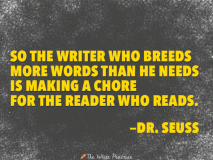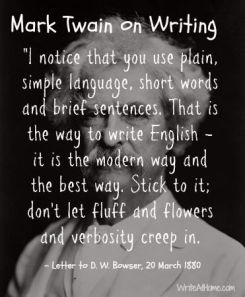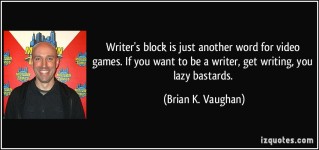Last weekend, I published this post about why we stop reading books. Many of you submitted insightful comments, and as I read through them I realized something: many of our “reading pet peeves” can be boiled down to the author doing one of two things.
Not bad, huh? Just avoid doing two things and you’re good to go.
I know. If only it were that easy.
Yes, these two things have “sub-things,” but it’s easier to remember two things than however many sub-things there are.
Side note before we dig in: Today is Read Across America day, so in a nod to Dr. Seuss I’m including a relevant quote by him and borrowing a couple of character names.
 Thing One: Showing off
Thing One: Showing off
This is basically any instance of the author demonstrating what an amazing word slinger he is. No words are too flowery or complex, no descriptions too long, no filters unnecessary. When editors suggest changes or readers stop reading and complain, it’s because they didn’t understand the author’s brilliance.
Which is fine, if the author wants to remain brilliantly unread.
But sometimes, it looks like the author is showing off when that’s really not the case (I know this happens from working with many, many writers in the critique group). We get protective and sometimes defensive about our work. It’s easier to get hurt feelings than to make changes when an editor says pages of description or a scene isn’t needed or when a critique partner says your word choice is too complex. When Faulkner said, “In writing, you must kill all your darlings,” this is the kind of thing he was talking about.

Listen to editors and critique partners (especially if two or more make the same suggestion). Cut the fat. Aim for your words going straight to the readers’ brains without complication. Realize that just because you wrote something doesn’t necessarily mean it gets to stay.
Elmore Leonard said, “If it sounds like writing, I rewrite it.” The primary goal of writing fiction is to tell a story. If the writing itself gets in the way of the reader enjoying the story, they’ll stop reading.
Thing Two: Being lazy
This is the opposite of Thing One (sort of). Whereas the showoff works hard (and perhaps for a long time) to produce something he thinks is brilliant, the lazy writer doesn’t do all the necessary steps to produce a readable book. He just wants to have written a book. This can mean not researching, not bothering to edit or work with critique partners, or being sloppy with formatting.

This isn’t entirely relevant but it made me laugh.
The showoff and the lazy writer are alike in that they think their work doesn’t need to be changed (hence the sort of). The difference is the showoff will likely offer pages of background on a topic they’ve researched while the lazy writer will include inaccurate details, which is completely inexcusable in the age of Google. Even if Lazy thinks he’s right, critique partners and editors will likely catch the error or at least suggest researching further – if he works with CPs and editors.
Grammar rules are well-established, and no one catches their own typos. There are tutorials about how to format or people for hire to do it. As Hemingway said, the first draft of anything is shit. If you’re like me, the second and third drafts are pretty shitty as well. It takes a lot more than a quick once-over for a book to be ready for publication.
I feel like I’m preaching to the choir a bit, as no one who reads this blog is a showoff or is lazy (obviously). So carry on, writers, and share this with the ones who really need it. 😉



Great Elmore Leonard quote!
LikeLiked by 1 person
Both very good pieces of advice, Allison. I tend to fall into group 1, not because I am deliberately obtuse but because I sometimes get carried away. I had to cut a lot of my darlings out of Through the Nethergate.
LikeLiked by 1 person
Group 1 is probably preferable, but if you don’t have a problem editing you might not be in either group. 😏
LikeLiked by 1 person
I love editing. I enjoy being given good advice from my developmental editors and it often results in quite big improvements and re-writes.
LikeLike
Reblogged this on Allison Maruska and commented:
As fellow writers prepare for #NanNoWriMo, I share a post from the archives.
LikeLike
Hi Allison! Per your earlier permission, I scheduled this article to be featured as a guest post on http://www.ryanlanz.com on July 13th. As usual, it has your credit/bio/links. Thanks!
LikeLiked by 1 person
Sounds great! Thanks!
LikeLike
Brilliant! Also, your observations are different from similar articles I’ve read that focus on cliches and overused themes and archetypes. Definately appreciated.
I feel like it’s tempting to embellish not only because of the feeling that you ought to in order to be a ‘good’ writer, but also because you have such love for your creation that you don’t want to leave anything out.
LikeLiked by 1 person
It’s definitely tempting to embellish, and that’s why we love our editors. 🙂
Thanks for reading and commenting! I’m glad the post isn’t like everyone else’s. 😉
LikeLiked by 1 person
Just read this in Jack M. Bickham’s book, Settings: “… you will write best if you force yourself never to try to be ‘fancy’ or ‘inspiring’ … The best style usually is no visible style at all–prose that is crisp, clean, clear and transparent: a pane of glass through which your reader experiences the story directly, without ever being aware of the words.”
LikeLiked by 1 person
I like that!
LikeLike
Reblogged this on Anna Dobritt — Author.
LikeLiked by 1 person
Reblogged this on Don Massenzio's Blog and commented:
Check out this post on Allison Maruska’s blog regarding two pitfalls to avoid if your writing a book.
LikeLiked by 1 person
So there’s just 2 things I need to do, huh? Awesome.
I think I bounce between lazy and wordy/showoff-y. I can definitely show off. I was quivering as I read this post, wondering if you were gonna get around to naming names…
How does a writer figure out he/she is lazy or showing off? For example, when I wrote what was unceremoniously described as The History Of Winemaking in “An Angel On Her Shoulder” – an incredibly dull section which was cut out of the final manuscript thanks to a delicately worded instruction by a friend (something along the lines of
“This sucks.
Cut it.
CUT IT ALLLLL!!!!
Cut it until your fingers are bleeding from using the delete key – and then cut some more.
Cut it all, please, please, please, for the love of God!
Don’t stop cutting. When you think you’ve eradicated this demonically dull screed from the face of the Earth, you haven’t. Cut more. It must be stopped!”
– at least that’s how I remember it), I wasn’t intentionally showing off. I knew that subject and I went into a deep dive of detail to give authenticity to the story and to explain the vintner’s anger that his children didn’t wanna go into the family business. What I didn’t know was I could just write “the vintner was angry that his children didn’t wanna go into the family business.”
Who knew?
So for those still wondering how they avoid becoming lazy or a showoff, or a lazy-showoff like myself, here’s a tip: join a critique group. They will quickly inform you of which you are (lazy/showoff) and most members there will help you become less of whatever offensive being you were and more of the good writer you wanna be.
LikeLiked by 2 people
That person who told you to do all the cutting sounds very smart. You should listen. 😉
I shudder to think what my writing would be without my CPs. I didn’t know what I didn’t know before I got there.
LikeLiked by 1 person
Yep. I ❤ my cps
LikeLiked by 1 person
Totally agree with both. Laziness tends to bother me more!
LikeLiked by 2 people
Same here. I’ll stick with a showoff for at least a little while, but something error-riddled gets promptly put aside.
LikeLiked by 1 person
Enjoyed the article. Thanks for posting it.
E6
LikeLiked by 2 people
Thanks for reading! 😊
LikeLike
Trying not to be verbose here?
LikeLiked by 1 person
Don’t feel very voluble lately. 🙂
LikeLiked by 1 person
Again, great post!
I couldn’t agree more with your observations and statements. This needs to be taken to heart by everyone (including me when my ego gets in my way).
Thanks again.
LikeLiked by 2 people
My ego likes to do that too. It acquiesces only after it has a chance to pout. 🙂
LikeLiked by 1 person